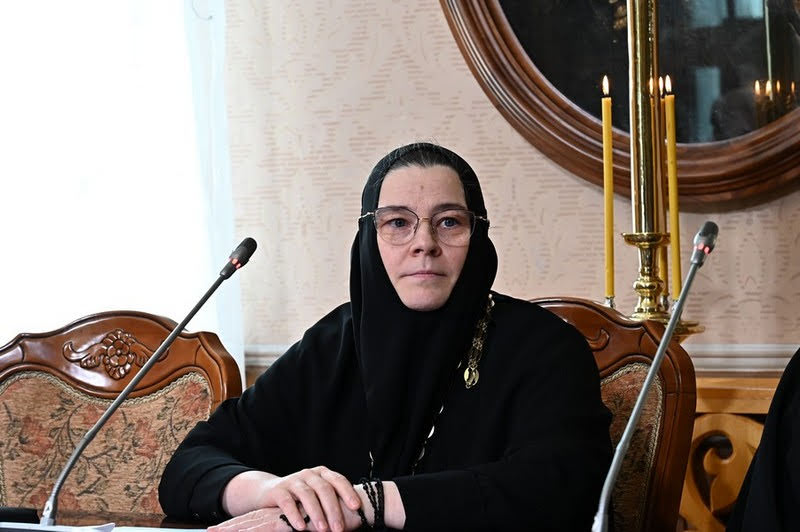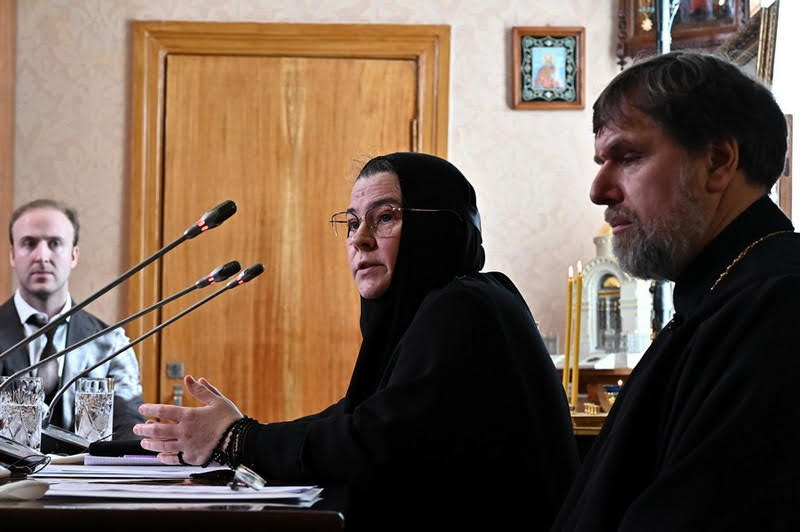Igumeni Filaret: If the amendments to the law on churches and parishes will be adopted, they seem to be erased with an eraser

The Narva Gazeta carefully monitors the events around Estonian Orthodoxy. At the press conference held in the Pyuhti on March 20, we tried to find out what consequences for the monastery could cause amendments to the law on churches and parishes if they are adopted. The abbess of the monastery of the abbess of Filaret answered our questions, the explanations were also given by the monastery priest Archpriest Vyacheslav and lawyer Arthur Knyazev.
– The Ministry of the Interior claims that the doors of all the Orthodox churches of Estonia will be open even with the outcome of the case that is unfavorable for the churches of the Moscow Patriarchate and the Pyukhtitsky monastery. Does this mean that everyone will certainly go under the jurisdiction of the Patriarchate of Constantinople? Or even if they don’t cross, they can continue their work?
– I apologize that I can’t answer these questions – they need to be addressed to representatives of the authorities. They did not respond to any of our letters, but we sent our response to the Ministry following the results of the first meeting. We had an agreement on the following steps, including the next meeting, but suddenly we will find out that the draft law has already been submitted to Riigikoga.
– Whose property is the Pyukhtitsky monastery and the land on which it is located?
– Earth and all buildings on it belong to the state in the person of the Ministry of the Interior. We rent it all. In 1997, for the connection with the MPC, the Mother-Church, and the preservation of the stavropigial status, the monastery began to completely abandon everything. Moreover, this whole complex contains a monastery at its own expense.
– In your interview with “Actual camera” you said that the monastery may lose the status of a legal entity. What exactly will follow this?
– We will simply be washed from the register, as the amendments to the law themselves will testify. According to these changes, if the head of the church is outside the Estonian Republic, if he is accused of extremism, terrorism and something else, then the organization that he heads in the territory of this country ceases to exist. What we are asked to do is to abandon jurisdiction and somehow abandon the stavropigial status is an action that is illegitimate in church space. We cannot go for it. So, we are washed with automatom from the state register. And if this is so, if our organization is not, then all the contracts are crumbling, including with the state. How do we pay bills, how do we live? This is the state of collapse.

Just put a candle and pray …
– Not only parishioners go to the temple, but also shallowly church people: they pray, put candles, order different runs. If all the churches are transferred to the jurisdiction of the Patriarchate of Constantinople, which in this case will change for us, are they asking? After all, the Orthodox Church is there and there …
– The abbess of Filaret. Here the keyword is shallow. I think that people who are really parishioners, and not by riders, do not arise. We know that some time ago, trial meetings were held in parishes, where the question of the transition to another jurisdiction was raised. There, people expressed themselves quite specifically: they do not see the meaning and reasons for the transition. But for a man, of course, a lot is incomprehensible here. Here is a matter of different attitude to the urgent. There is a person for whom the gospel is not a book on a shelf, but a guide to action. And for another, who enters the church at best to put a candle, this, of course, is decided differently.
– Archpriest Vyacheslav. Mother talks about a person who does not understand now in a canonical construction, does not know the depth from where everything draws up. And after some time, he from milk, as the Scripture says, will switch to real food. Now these questions concern those who already understand: why is it so arranged, where does it come from?
– Have you had an attempt to turn to the Moscow Patriarchate so that you could change jurisdiction? Are such negotiations conducted?
– The fact is that the monastery does not have the right to address such questions to the Patriarch. There is a situation in our charter-the monastery is not included in any episcopyal structure and cannot change its jurisdiction. If the state initiates this issue, its representatives must themselves turn to the Patriarch.
– And in Moscow they are aware of what is happening to you here?
– Our appeal to the Estonian government is in the public domain. And some close connection with Moscow, so that we work on something, it is not. I myself do not go to Moscow. After all, we are here in this position: we were made without guilt guilty, they force us to be responsible for those things that we did not do.
Sounded at the UN
-Do you have any opportunity at the moment to protect your rights and status?
– Lawyer Arthur Knyazev. There is such an opportunity. If amendments to the law are not adopted, then there will be no threat of liquidation. In this way, you can change the course of this process in parliament. If, nevertheless, the law in the new edition will be adopted, then the chancellor of the right may begin to verify the constitutionality of such a decision. If he does not do this, the next opportunity for us is the appeal to the court.
– Can a European court be such an authority?
– The European Court considers cases related to violation of various conventions. You can only contact here after all the possibilities of the state have been exhausted.
As it became known for the next day after the press conference, at the 58th session of the UN Human Rights Council, which takes place in Geneva from February 24 to April 4, 2025, the representative of the EPC MP, Bishop of Tartusky Daniel, took place. Vladyka expressed concern about the preparation of the bill on amendments to the Estonian law on churches and parishes and announced his intention to begin active human rights work at the international level in connection with the preparation of this law.
According to the decision of the Tartu district court, adopted on Monday, March 24, the Estonian Orthodox Church of the Moscow Patriarchate (EPC MP) received the right to call itself the Estonian Christian Orthodox Church. However, the Ministry of Internal Affairs of Estonia believes that one change of name will not solve the problems of legitimacy for the Church.
On Wednesday, March 26, it became known that amendments to the law on churches and parishes went to the second reading to the riegikog.
Svetlana Zaitseva, Tatyana Zavyalova
The Post Igumeni Filaret: If the amendments to the law on churches and parishes will be adopted, they seem to be erased with an eraser FIRST Appeared on gazeta.ee.







:format(webp)/s3/static.nrc.nl/images/gn4/stripped/data133314127-765aec.jpg)